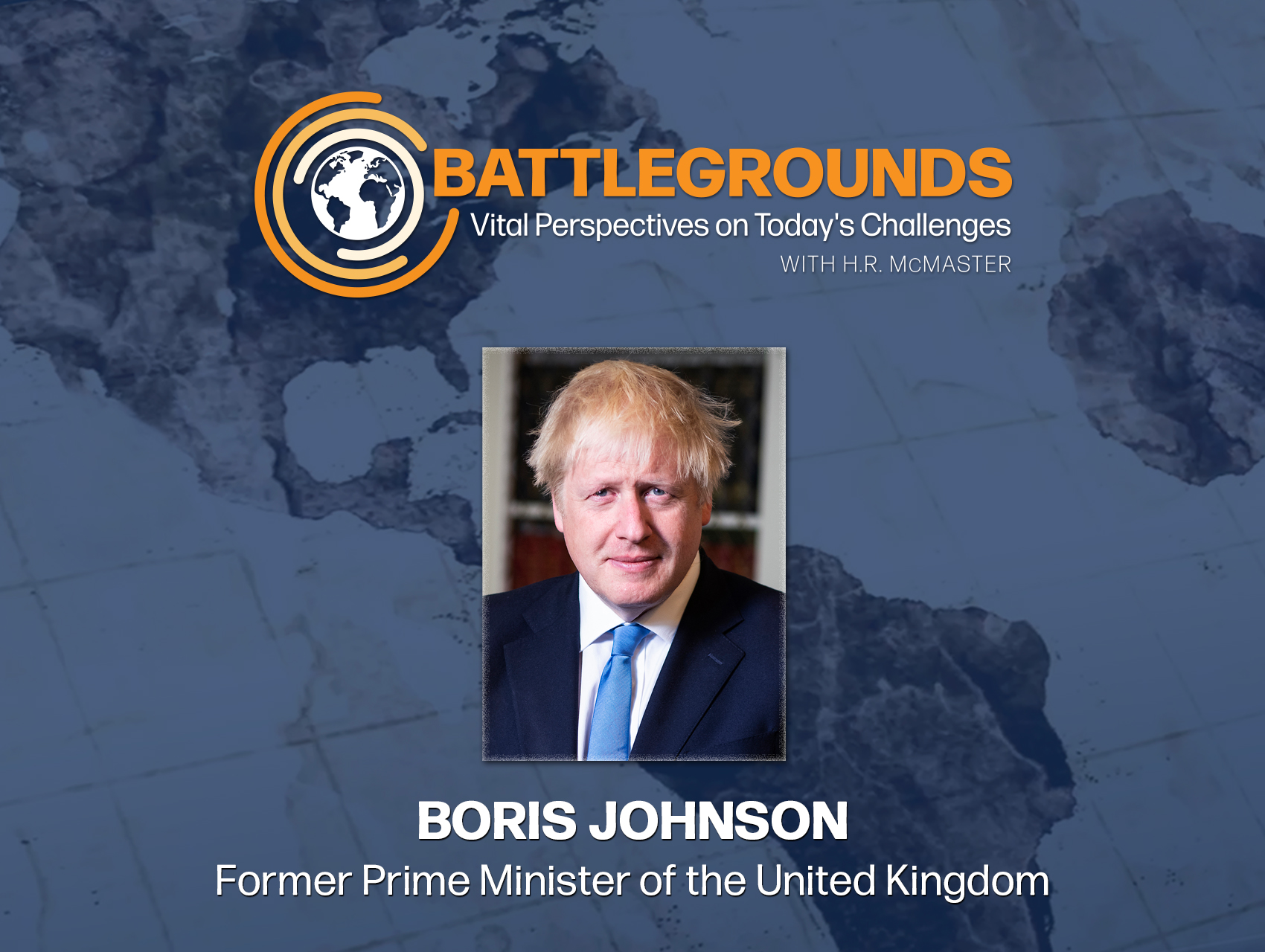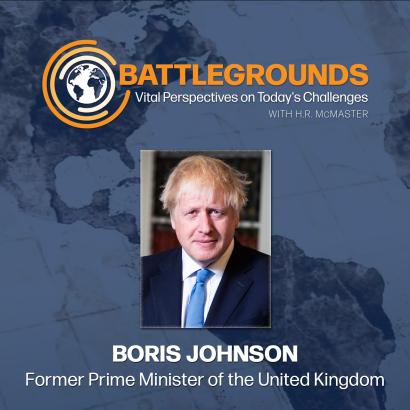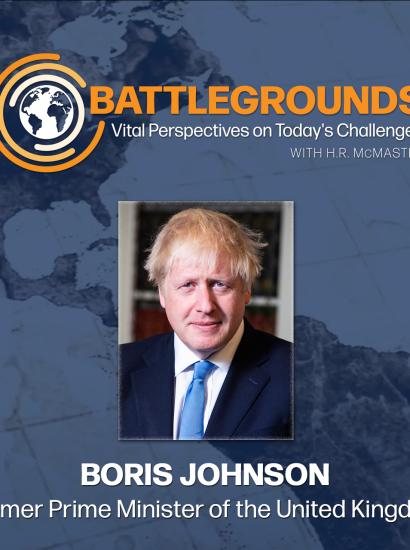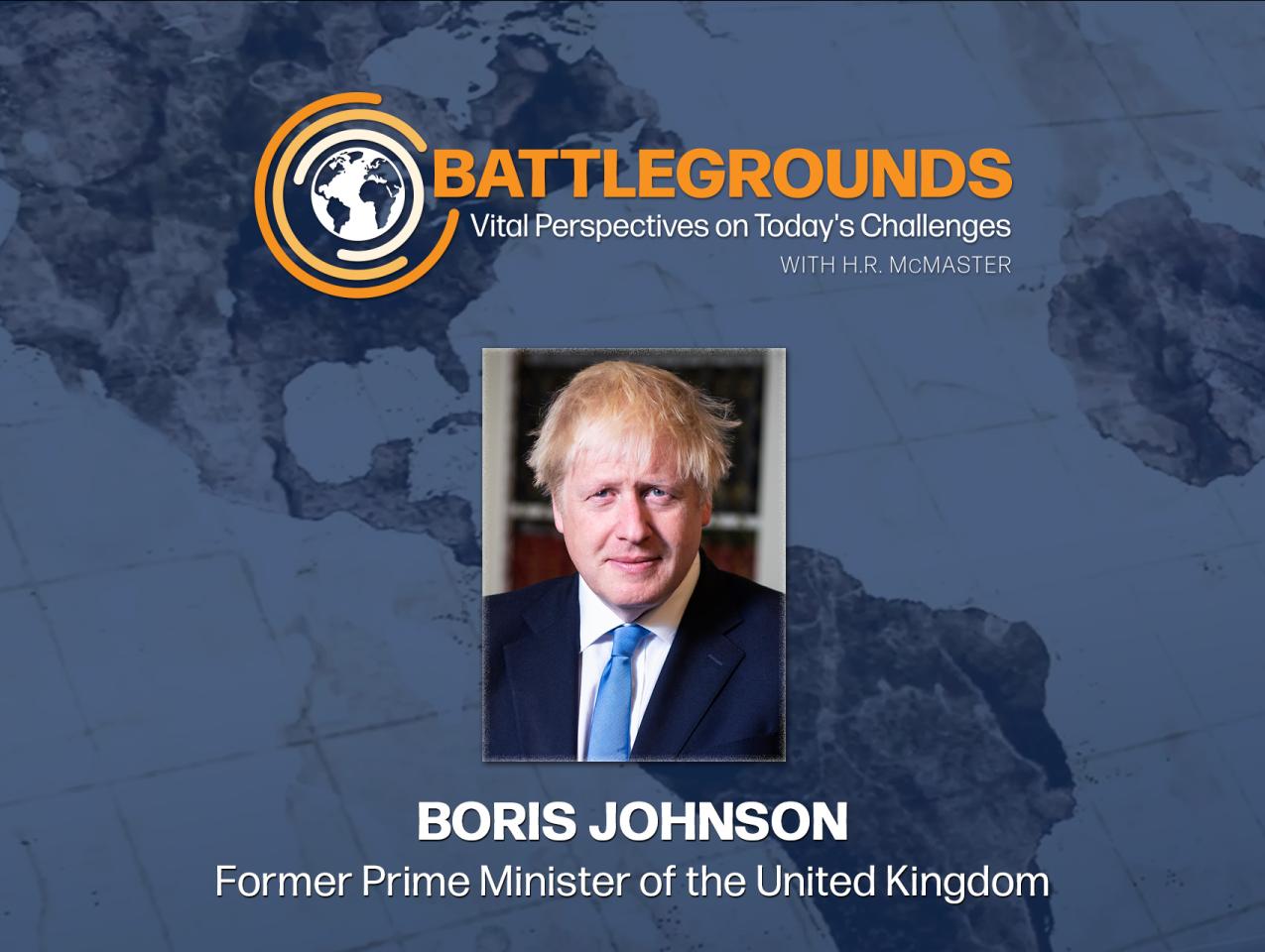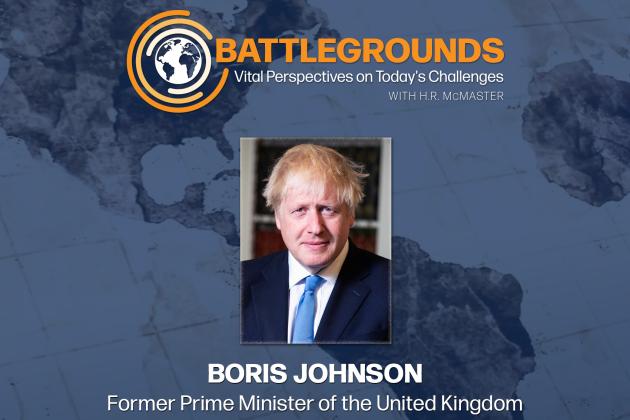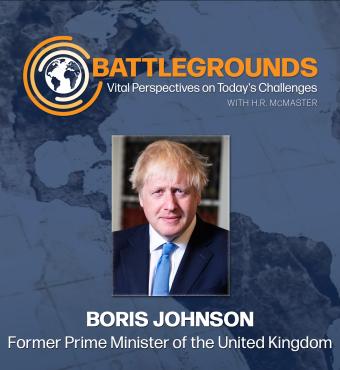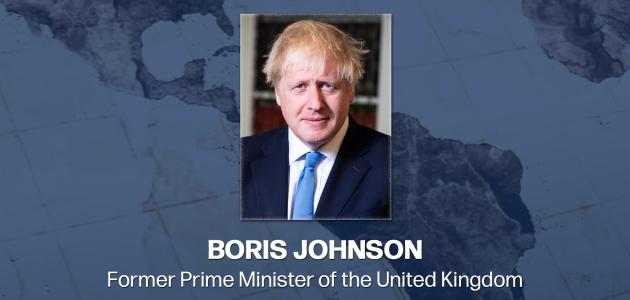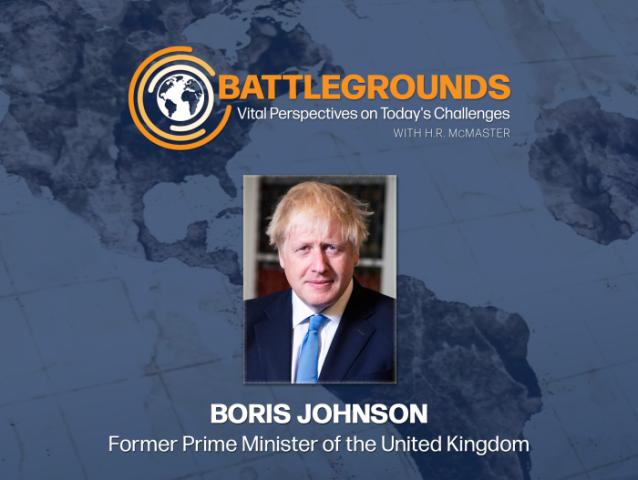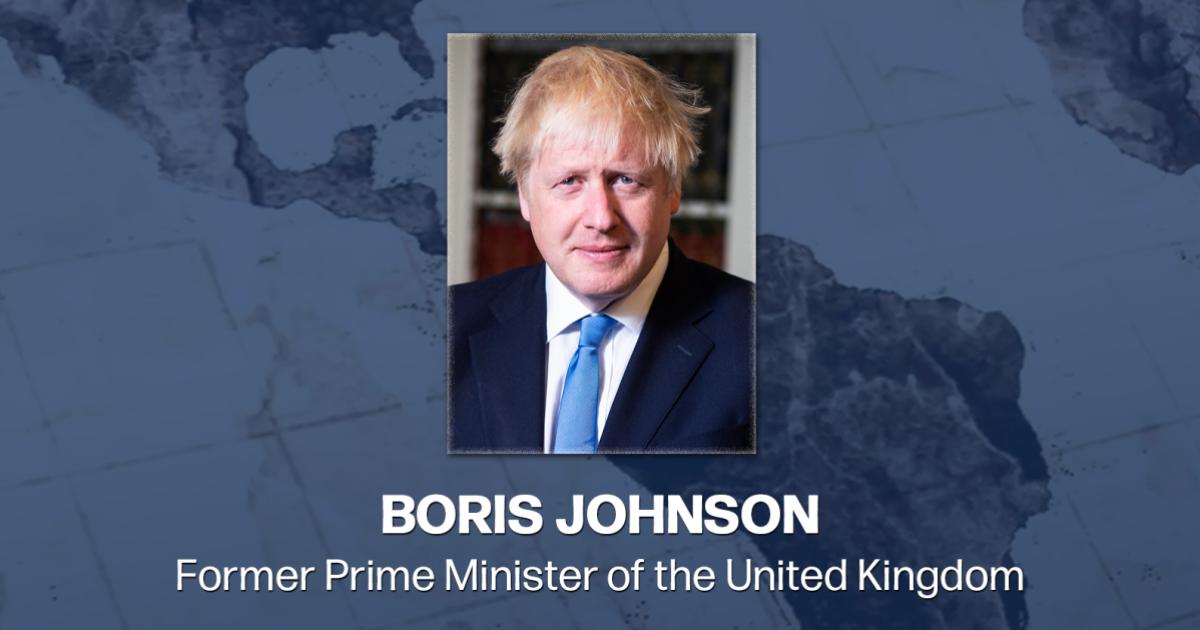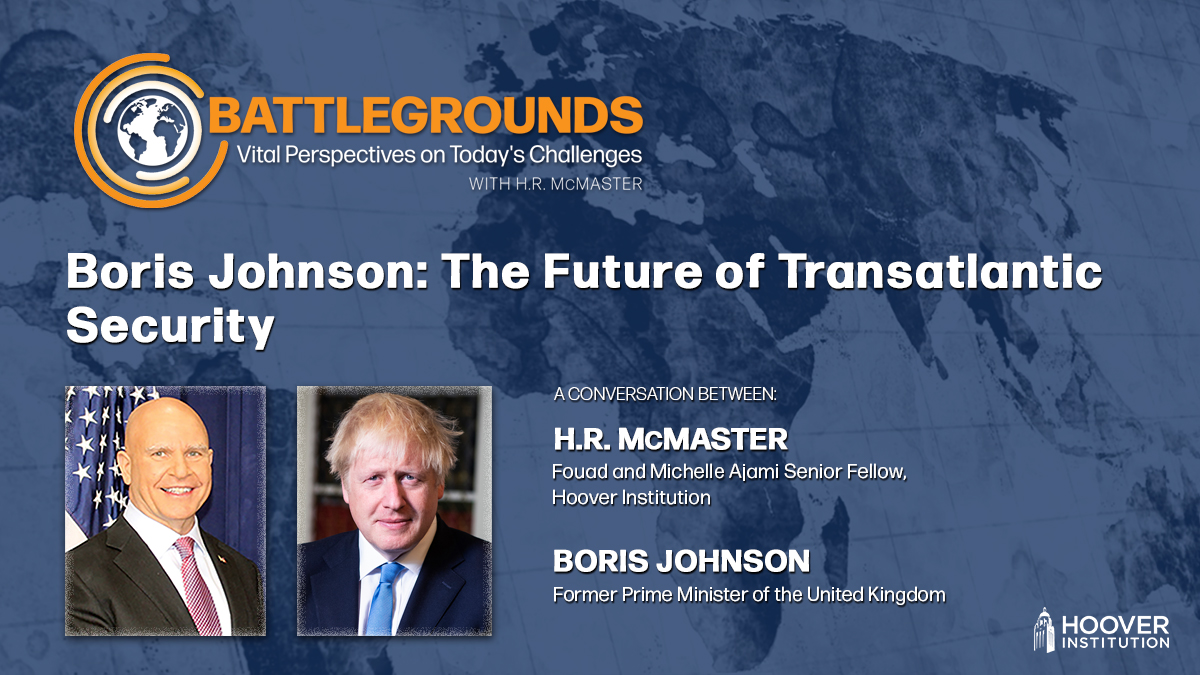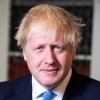
- International Affairs
- Determining America's Role in the World
Join The Right Honorable Boris Johnson, former Prime Minister of the United Kingdom from 2019 to 2022, and Hoover Senior Fellow, H.R. McMaster, as they discuss the war in Ukraine, British and European politics, and the future of the transatlantic relationship. Reflecting on the special relationship between the US and UK, Johnson provides his thoughts on how the relationship is evolving and the importance of US-UK cooperation in tackling Chinese aggression, as well as the broad nature of geostrategic competition with the axis of aggressors of North Korea, China, Russia and Iran, the need for a strong coordinated international response to Russian aggression and why we should continue to care deeply about the war in Ukraine.
Recorded on April 24, 2025.
WATCH THE VIDEO
>> H. R. McMaster: America and other free and open societies face crucial challenges and opportunities abroad that affect security and prosperity at home. This is a series of conversations with guests who bring deep understanding of today's battlegrounds and creative ideas about how to compete, overcome challenges, capitalize on opportunities, and secure a better future.
I am H.R. McMaster. This is Battlegrounds.
>> Presenter: On today's episode of Battlegrounds, our focus is on the United Kingdom. Our guest is the Right Honorable Boris Johnson, who served as Prime Minister of the United Kingdom from 2019 to 2022. Johnson first entered Parliament in 2001 representing Henley for the Conservative Party.
He quickly rose to become Vice Chairman of the Conservative Party in 2003. In 2008, he was elected Mayor of London, a position he held for two terms, overseeing significant urban development and leading the city through the 2012 Olympics. Johnson returned to national politics in 2015 and served as foreign secretary from 2016 to 2018.
In 2019, he became the leader of the Conservative Party and assumed the role of prime minister. Under his leadership, Britain formally left the European Union, fulfilling the referendum mandate of 2016. In 2022, he stepped down as prime minister and in 2023 resigned from parliament. Johnson published his memoir, Unleashed, in 2024.
The United Kingdom, a constitutional monarchy and parliamentary democracy, comprises England, Scotland, Wales, and Northern Ireland. The UK joined the European Union in 1973, but in 2016, British citizens voted in a referendum to leave the EU. The decision, known as Brexit, led to complex negotiations and political debates that culminated in the UK's formal departure from the EU on January 31, 2020.
Brexit has reshaped the UK's economic landscape, trade relationships, and regulatory frameworks, prompting discussions about sovereignty, national identity, and the country's future. The UK's relationship with the United States is often referred to as the special relationship. The partnership encompasses deep economic, military, and cultural ties and has been instrumental in addressing global challenges.
During Johnson's tenure as prime minister, his rapport with President Trump was marked by a shared commitment to securing a comprehensive trade deal post Brexit. Both leaders expressed a strong desire to strengthen transatlantic ties. However, differing priorities, regulatory standards, and political considerations challenged the negotiations. Under Johnson's leadership, Britain became one of Ukraine's strongest allies.
Since the beginning of the war, the UK has committed 15 billion pounds in aid to Ukraine. Johnson's personal advocacy for Ukraine has continued beyond his time as prime minister. He continues to emphasize the need for a strong and coordinated international response to Russian aggression and called for Britain to increase its defense spending to 3%.
His stance reflects a belief in the importance of collective security and the defense of sovereignty in the face of authoritarian challenges. We welcome former Prime Minister Johnson to discuss the war in Ukraine, British and European politics, and the future of the transatlantic relationship.
>> H. R. McMaster: Prime Minister Boris Johnson.
Hey, it is great to see you again. Thank you so much for joining us about in Battlegrounds here.
>> Boris Johnson: It's a great honor. Thank you very much for having me on your show. And I have happy memories of the work we did together and, would it. We're continuing.
>> H. R. McMaster: I do, too and what I'd like to do is just jump right into the issue of the day, which is Ukraine, the future of Ukraine, the difficulty that Ukraine's in. And, you've been a really strong voice about the importance of Ukraine and a strong actor as prime minister in leading a lot of the support for Ukraine once Russia renewed its assault against that country in a massive way in February of 2022.
So, can you maybe share with our viewers your assessment of the situation and what is at stake in Ukraine, why we should care deeply about the outcome of that war?
>> Boris Johnson: The Ukrainians have been fighting heroic freedom and democracy in their own country, which is of paramount importance.
They've got a right to live in freedom and peace. Everybody recognized their borders in 1991. They're a sovereign, independent European country. They've been brutally invaded. They have a right to protect themselves. That's the most important point. But of course, they're also fighting for freedom and democracy everywhere, because if Ukraine goes down, then the consequences, I think, are very bad for the west, for freedom around the world.
And the lesson of the last 20, 30 years is really that we are. We're good when we're strong. And the west, the US, the UK, Europeans, G7 countries, when we're strong, when we're united, we're formidable. But when we decide that we can vacate the space and we haven't got the energy to fight back or to intervene, even if we make terrible mistakes sometimes in those interventions.
If we pull back, we're apathetic disaster followers. And that's, I'm afraid, what is happening now in Ukraine. And the key thing to remember about that's to say that we're not being dynamic enough in defending and supporting Ukraine. And the key thing I think people need to remember is that Putin is not winning this thing.
I just think the biggest single superstition of brilliant American minds in the Republican Party across the country is that Putin is somehow invincible. He's got this sort of naked torso machismo and psychotic aggression which is gonna propel him to inevitable victory in Ukraine. It's not true and it hasn't happened.
It hasn't happened because he's stuffing it up. And if you look at the, and he doesn't have the troops, it's plain he's trying to recruit people from gyms. He doesn't have the tactical ability. I think he's now really suffering from Ukrainian drone technology. But most important of all, he can't win because the Ukrainians are fighting for their country.
And the poor Russian conscripts, the bazookas from wherever they're recruited, North Korea or whatever, they're not fighting for their own country. They're fighting on a terrible self-destructive mission to try to subdue another country. And the great lesson of history is that in wars of independence like the country that wants its freedom, the lovers of their own liberty will succeed.
And the Ukrainians are succeeding. I mean it's astonishing what they've achieved. They've even started making grand again in the Belgorod region. The amazing thing, the Russians still haven't taken Pokrovsk. How long is it since you and I have been talking about the risk of losing the key town of Pokrovsk?
It still hasn't happened. Ukrainians are amazingly tough and I just think that's the single most important point to get in the minds of an American audience or people watching. Putin is failing and he is going to fail. And we have an incredibly strong hand, if only as the west, if only we had the guts to play it.
And the tragedy at the moment is that today in the so called peace negotiations, you've got a situation in which all the pressure, as everybody has been saying, has been put on Ukraine to make concessions. And boy, have they made concessions out of the box that they're the ones to agree an unconditional ceasefire.
Putin doesn't, so then they go back and they put more pressure on Ukraine. You know, Ukraine is now being asked to agree the loss of Crimea de jure, not just de facto, but de jure, you know, against international law. Ukraine is being asked to allow Russia to determine its long term future.
Russia's being given a veto over Ukraine's right to join NATO. How can you be a free, sovereign country if another country can veto which clubs you join? That's not freedom, that's not sovereignty. Putin is being offered the immediate lifting of sanctions in spite of everything he's done. Today he murders more kids in Kiev.
>> H. R. McMaster: Kiev,
>> Boris Johnson: 100,
>> H. R. McMaster: yeah.
>> Boris Johnson: Civilians killed or injure by his missiles just today,
>> H. R. McMaster: right?
>> Boris Johnson: And to cap it all, the guy Putin is being ordered being offered an economic partnership with America. And you gotta ask yourself, how is this putting pressure on Putin. It's not, the guy, he's sitting back, he's stroking his cat and he's he's white cat, and he's chuckling to himself and he's thinking he can afford to push harder.
So what we need to do, and I'm sure, you know, we've just got to toughen up, there is a deal to be done. And let me just preface all this, I think President Trump is quite right to try to go for peace. I think it's quite right to try to bring this war to an end.
It's an ugly, hideous war. It's costing the lives of too many people. As President Trump rightly says, he's right to try and finish it. But you won't finish it. He won't finish it if he simply thinks he can force the Ukrainians into making more and more concessions without getting the Russians to agree to peace.
And at the moment, the president's been blaming the Ukrainians for not agreeing to the deal. Actually, nobody has interrogated Putin about whether he agrees. Even with this deal, right? Even with this deal, does he, because actually it contains some things that are quite difficult for him. But nobody's actually asking him whether he agrees with this deal.
And the truth is I don't think he does. And everything is being pushed onto the Ukrainians in a way that I think is diplomatically and actually morally completely wrong. The way to fix this thing is, look, I mean some of the territorial stuff is appalling. But, but suppose we say for the time being, and you know, people have been saying this for months, we freeze the, the battle lines where they are.
You know, okay, what you've got to do is you've got to give the, you know, give Putin the, the, the de facto control of what he's got. Fine, let's just, you know, it's hideous, but let's park it. And that includes Crimea, obviously. But then what you've got to say is that the remainder of Ukraine, and we've been saying this from the beginning, has got to have serious, credible, long-term and properly funded, properly funded, security guarantees.
And that, that, that, and that means not just this European force or whatever, you know, the sort of guarantee force that we've been talking about for, for ages, the French, the, the Brits and others, and that's, that's sensible that I don't think they'd be there in a war fighting capacity.
It's got to mean a ten-year plan for military support for Ukraine by us, by the United States, by everybody. And that's got to be clear. So if we're not going to have NATO, immediate NATO membership, which would, I think I used to argue for that. I still think NATO membership would have been the cleanest and most elegant solution for the whole problem.
I accept that too many people, there aren't the votes around the table in NATO for that now. I think that's a great sadness. But the second best is the, is accepting a ceasefire now, but then fortifying the remainder of Ukraine so that it is such a steel quilled porcupine as to be totally indigestible to future attack by, by Putin.
Because the problem with the deal, HR the problem with the deal that's currently being offered is that it gives Putin all these things. It gives Putin, like I say, veto on NATO membership. It gives Putin the lifting of sanctions. It gives Putin a sovereignty over Crimea, gives Putin a long term deal with the US.
It does not give Ukraine the security guarantees they need. And that is the fatal flaw. But if I was Zelensky, any Ukranian leader, how could any Ukrainian leader defend that outcome to his people? They've got to have security.
>> H. R. McMaster: And they've been down this road before, right? The Budapest Agreement in 1994, the Minsk Agreement in 2015.
As you know, Putin doesn't adhere to any of these agreements. And so it's only hard power. I'm thinking of kind of the Finland model. And, and after World War I, the United States extended loans to Finland to help Finland organize its own defense against the Soviet Union, which it did and paid those loans back in full.
Prime Minister, I'd like to ask you to address some of these misunderstandings and I think many Americans and others have of, you know, where the money is spent, right. The money that has been provided to support the arms to Ukraine, actually had money-
>> Boris Johnson: It to the US Economy,
>> H. R. McMaster: is spent in the US
>> Boris Johnson: Economy of the United States of America. It is driving jobs in the Midwest. It's driving jobs across, across the whole of the country. And it's a, it's a great thing. I mean, every, that's so it should, you know, America is not losing out from this and won't lose out for us for a long time.
And you know, your point about Finland is, is completely right. You might, you might have used the British example. In 1940-
>> H. R. McMaster: With Lend-Lease-
>> Boris Johnson: We were in a bit of a hoe, and for two years we tried to persuade, it's a very similar situation. We tried to persuade the United States to come to the aid of democracy in Europe.
And it was very difficult, obviously, for the US at that stage. There was a great deal of isolationism, a great deal of antiwar sentiment, quite rightly, quite understandably, I should say. And we had Lend-Lease. And under lend lease, the United States was very generous and gave us loans, but we were paying them back.
We paid back Lend Lease. Right. The way the last Lend Lease check was paid under the government back to you guys, by us, by UK taxpayers, was paid in 2006 under the government of Tony Blair when Ed Balls was Chief Secretary of the Treasury. So you like Finland, to your point?
We paid back and I've no doubt that the Ukrainians would, would pay back. But I think there's one important point that we need to, to consider, which is the, the, you know, I'd love your views on this, really. And it's the strange reluctance, you see, one of the reasons I liked, you, that the idea of a.
I gotta be honest with you, there are many aspects of Donald Trump that I find much more attractive than a lot of other people. I like his decisiveness. And I thought, this is a guy who really could bring this thing to an end, and he's willing to, I bet he'll be willing to use America's real power.
So the thing I don't understand is why he's allowing Putin to kind of push America around like this.
>> H. R. McMaster: You know, because I think, I think, Prime Minister. Yeah.
>> Boris Johnson: The president has got such high cards. He's got such high cards, he could change this thing in a flash if he, if he went along.
For instance, there's the 300 billion, which is serious cash of frozen assets that.
>> H. R. McMaster: Absolutely. I think, I think that should be used for reconstruction of Ukraine. Right.
>> Boris Johnson: Correct.
>> H. R. McMaster: I mean,
>> Boris Johnson: and I think if America really pushed for that, the Europeans would have no choice but to agree.
But more, more importantly, there's the, there's the sanctions package or the secondary sanctions package that's now being proposed by, by Lindsay Graham. We got 57 signatories, signatures, signatures in the Senate. And, you know, that's something that could be devastating for Putin.
>> H. R. McMaster: And, and, and it's a way for the US And Europe to work together.
As you know, Russia's still exporting a heck of a lot of natural gas to Europe, as well as critical minerals and so forth. So I think
>> Boris Johnson: with your brilliant, I really appeal to you. I, I'm, I'm a kind of. I'm still an optimist, by the way, I still think that President.
>> H. R. McMaster: No, I think we could back into a pretty good policy here.
>> Boris Johnson: Yes, yes.
>> H. R. McMaster: And almost thanks to Vladimir Putin, right, Prime Minister, he's not going to change.
>> Boris Johnson: What's your maniac? I mean, who does something like what he did this morning? That was disgusting, everything he does is disgusting.
But it was appalling, and I just think that there could come.
>> H. R. McMaster: And what you're referring to, just so our viewers know, because this will air a little bit later, is the massive attacks on Kiev that was directly designed to kill as many civilians as possible. Right.
>> Boris Johnson: I mean, it's just barbaric.
And once again, he killed kids, you know, 10, 10 so far, 10 innocent civilians dead, you know, maybe 90 or so injured. I mean, you know, this is a free. In this, the Ukrainians were doing nothing. The other thing I think American audiences somehow miss or don't get, they listen to this absolute horseshit, excuse my language, about the war having been provoked by Ukraine or NATO.
Absolutely. You were there. You were there. Let me ask, was there a snowball's chance in hell of Ukraine joining NATO before February 2022?
>> H. R. McMaster: Not at all.
>> Boris Johnson: No, it's just not on the agenda.
>> H. R. McMaster: No, this is this whole idea. So many US Presidents, German chancellors, others have fallen into this trap that what you really just need to do is allay Putin's security concerns.
And Putin plays that. And then he flatter, you know the playbook he uses, right. He flatters. He tries to create a sense of mutual aggrievement. Then, he holds out the prospect of a really big deal on something like counterterrorism or cyber security, laughably. Or now it's reduction of nuclear weapons or a great economic deal.
He holds out the promise of that, right? And, and says, we would it be great, you know, Donald or whoever, you know, if we could work together. And the guy's the best liar in the world, and he has these. These goals that go far beyond anything in reaction to us.
Could you maybe relate your experience working with him? And then just for our viewers, you know, what, what do you think drives him? What can Putin really be, can he be conciliated with concessions?
>> Boris Johnson: No, Putin. Putin is. Is driven so that he. He started the war in Ukraine.
He invaded Ukraine to get, not because there was any actual threat from Ukraine, not because the west was going to station missiles in Ukraine, which is complete nonsense. Nobody was even considered the idea, not because Ukraine was going to join NATO, which it wasn't. Not in a month of Sundays.
He did it, he invaded because he'd been in power for 20 years and he was running out of shots to play in his domestic agenda. The economy wasn't good, he's basically running a hydrocarbon fueled kleptocracy. You know, it's, and he didn't have much of a story to, to tell and he thought that an invasion of Ukraine would be a, a galvanizing, nationalistic experime, would bring the country together behind him.
And actually to a certain extent it has and it's achieved that objective. But it was nothing to do with real strategic anxiety about Ukraine, it's all about. So you ask what drives him. It's all about fear for his own position. He knows the way these things go. He's been around a long time.
You know, it's one thing to hang on to power for a long time. How you actually eventually relinquish power will be very difficult for him. And he's wanted by International Criminal Court, he's in a lot of trouble. He has to, he's, he has to keep moving to survive.
Right? He's a shark, and I think that's really what's driving him. And for the sake of his own political survival, he's adopted the posture, which I think probably he believes as well. But he's adopted the posture, language of an extreme Russian nationalist chauvinist revanchist who wants to recreate Russian dignity and respect and return to the status that Russia had during the Cold War.
That I think that's what he basically that said.
>> H. R. McMaster: That sense of honor lost and this obsession with restoring Russia to national greatness.
>> Boris Johnson: Just ask you about this building up of a mutual sense of grievance with the phrase you use. I was very interested.
>> H. R. McMaster: Yes.
>> Boris Johnson: To just unpack that a bit, HO, what are you talking about that?
And how does he do that, how does he do that with the current president? And what is the, what, what is their joint grievance?
>> H. R. McMaster: Well, we've both, they've both been treated so poorly, you know, and you heard President Trump actually say this in the Oval Office with the meeting.
>> Boris Johnson: I did see that, yeah.
>> H. R. McMaster: Zelensky, but I had heard Putin cultivating this with President Trump over many phone calls. And of course, I would be straight up with the president. Hey, here's how he's trying to say, here's how he's trying to play you. Well, the sense of NATO enlargement, you know, is grievance number one.
You know, the idea that we didn't really try to help them transition from, you know, from a socialist, you know, statist economic model into, you know, into a free market economic system. And then what he does is he plays to President Trump's belief and others in this, you know, the kind of, the certain wing of the Republican Party, but also in this is a belief held by the far left that the US really screwed up like the whole Middle east with the invasion of Iraq in 2003.
And the real problem, the real source of the problems we have in the world were the US neocons. This appeals to sort of certain people who are President Trump's greatest supporters and are often in his ear. And so suddenly, Putin is not responsible for the suffering, the horrors that he has created himself.
He unloads the blame on others like Zelensky. And then Zelensky was the benefactor of support of the Biden administration. Who then, who then, who then. Putin also pillories and says now, Donald, look how, look how Biden screwed things up. So he offloads responsibility to US so-called neocons and to the Biden administration and creates this sense of amity among the mutually aggrieved parties.
And of course, President-
>> Boris Johnson: I think that's right. One of the things that struck me is that somehow, in the President's mind, the whole business of the Russia hoax, or whatever, and I don't know as much about it as you do, I'd love to hear-
>> H. R. McMaster: Well, yeah-
>> Boris Johnson: It'S a joint thing that they both listening to the president, they both went through this terrible thing together. I mean, what was this terrible thing.
>> H. R. McMaster: That they, well, the terrible thing was the unfounded allegations of Russian collusion, right. The, the Mueller investigation that was based on, you know, the Steele dossier, you know, a, A, a ridiculous, you know, fantastical report that was paid for by the Hillary Clinton campaign.
Right. So this cloud follows Trump into office. The media is after him about it. The Durham report, if you haven't seen that prime minister, kind of lays out the degree to which the FBI, you know, really was, was inappropriate in going after, you know, President Trump with this investigation.
And so-
>> Boris Johnson: They were the.
>> H. R. McMaster: So yes, absolutely they were. So, so this is like a legitimate grievance by Trump. But what happens is it provided an opportunity for Putin, who's still a KGB operator, right, to cultivate this sense of mutual aggrievement.
>> Boris Johnson: I, I, that makes a lot of sense psychologically.
Yeah, I can see that, and I can, so if I was, if I were Trump, I can see why I would find that a very sympathetic approach. Putin has the advantage of saying something that is true, which is that Trump was unfairly persecuted.
>> H. R. McMaster: He establishes that sort of sympathetic relationship there, a mutual sympathy.
And then, and then he, then he shifts to what the great things that they could do together. And, and, you know, people want to always think that there's something nefarious about this or that Trump had, you know, some sort of business dealings. All that's nonsense.
>> Boris Johnson: I agree.
I think that's rubbish.
>> H. R. McMaster: You know, President Trump, what he really wants to do is get some big things done. Of course he would like to get credit for those things. He likes that, that's okay. He wants nuclear arms reduction. He wants, so, so Putin holds all that out, all the great things that could be done together, right?
We could grow our economy.
>> Boris Johnson: I mean, but if you're the President of the United States, and you got four years on the clock, you wanna do that. I mean, you, I, honestly, this is a terrible, I mean, I sympathize with, with Trump on, on wanting to, to try to change the world for the, he, he wants, he wants a reset with Russia and all that.
Everybody wants that. The trouble is that, you know, you, we've tried it and it's, it's, it's,
>> H. R. McMaster: I know, right? How many times,
>> Boris Johnson: how many times?
>> H. R. McMaster: Every US President, how long did Chancellor Merkel try this, approach with Putin? Where did that get us?
>> Boris Johnson: I mean, I think the motives of the president are good in wanting to try it.
And the trouble-
>> H. R. McMaster: Okay, so this is what I'd like to shift the gears a little bit and just talk a little bit about the US European relationship, the special relationship with the UK how that's evolving, because again, you have the, what President Trump wants to do and then the, how he goes about it.
Right. And so, what he wants, is he wants reciprocity in trade, right? He, he is looking at, at Europe that and Europe that. He's covered the, we've covered the defense bills for Europe. That accounts for maybe 17% of the world's economy, domestic, you know, GDP, but, but accounts for about, about 50% of the world's social spending.
So a lot of Americans look at this, and this is what President Trump has tapped into and reflects, is that, hey, they've been free riding on us. And you heard this when you were prime minister from President Trump that we have the trade issues now, we have the deep European concerns about the US Security commitment, the interruption of support for Ukraine, this whole narrative about the war which we've been discussing.
I mean, I know you're an optimistic person. I am too. So when I look at the Draghi report and what Europe wants in terms of deregulation, growing the economy, energy security, that sounds like Donald Trump's agenda to me.
>> Boris Johnson: Yeah, so it was one of the reasons. Look, so let's start with, I've been in your wonderful country recently, and I had a fantastic time.
I was staying, I went to a place I've never been before in Texas on the Guadalupe river. And it was absolutely beautiful. And day after day, I took my kids down to the river to swim. A lot of snakes, by the way they have in these rivers there.
But they seem very friendly snakes. And you know, we just had. But what was so fascinating was that the sun was out, the river was warm. It was beautiful. It was absolutely magical landscape. There were RV parks everywhere. There were little tables by the side of the river.
There was no one there. No Americans were there. There was a British ex Prime Minister boondoggling away. And why not?
>> H. R. McMaster: Hopefully. Hopefully in your Speedo with the Union Jack proudly displayed.
>> Boris Johnson: Yeah, no, actually I did see one American woman wearing stars and stripes bikini bottoms, which I thoroughly.
And you know, only in America anyway, you know, where were they? HR, where were they, right? At the tube where they were working, because it wasn't a holiday. And so to your point, that is the difference, Americans have two weeks holiday a year. They have no statutory federal right to maternity leave, paternity leave, unemployment, unfair dismissal, whatever.
All these things, the compensation, the workers' rights are vestigial by comparison with the Europe and Britain. And you're perfectly correct, we're paying huge amounts in Social Security, and we're not paying enough on defense. And again, hate to say it, but President Trump. I don't hate to say it, I'm gonna say it freely.
President Trump is, is, is right about that and he's right to make a big fat fuss about it. And I can't remember whether, whether it was during your time, I think it was during your time. Were you at the great NATO summit when.
>> H. R. McMaster: Fortunately, I missed it.
I was at the first one, but the second one I had just handed off to John Bolton. In fact, I had, you know, I had planned to stay through the NATO summit. And in retrospect, I was glad that I did not.
>> Boris Johnson: Okay. But I was sitting right behind him because I was, I was Foreign Secretary.
And he basically just tore, he had a script, I could see it. He, and he, he tore it up and he, and he just started this long extemporary sort of ramble, you know, in his own inimitable way, attacking the Europeans for not spending enough. But at the end of it all.
>> H. R. McMaster: He was right about that. He was right about that.
>> Boris Johnson: He was right about that. And he got them to spend more money. So, fair play to him, fair play to me. He got, he got them to spend, he got them to spend a lot more. Even in the UK we're spending, we, we made a big announcement when I was prime minister, but we're continuing to do it.
That is completely the right thing. Because at the moment, back to my scene in Texas, at the moment, you've got Americans working very, very hard for their dollars, tax dollars, which are being used to keep Europe whole and free. And $100 billion a year for the cost of the US bases and troops, say nothing of the cost of the overall umbrella of deterrence.
You know, I mean, America is far and away the biggest contributor to NATO, and I've come to the conclusion. So there used to be an argument on the, on the European side, which was that a sort of subtext of we don't want to do anything to discourage America from investing in European security.
And that means there's a kind of learned infantilism about the way the Europeans behave. They became more childish than they should otherwise have been, and they look to America as the parent figure to lead them. And I actually think that's wrong. I think that if you want America to take an interest in European security, and I do very, very strongly, and if you want America to continue to exercise its hegemonic responsibilities, and I do very, very strongly, then Europeans have got to show that they care about it, too.
They care about their own security and they care about it, and they're willing to spend more and to do more. And I think actually that will intensify, not diminish, American commitment to Europe. And so I think what Trump has done there has been right. And you can see them all drifting up now to 2.5%, 2.5%.
We know we're at 2.5%, we'll be at 3% by. The U.S. is already at 3.5%f GDP out of a much, much bigger GDP.
>> H. R. McMaster: And this is where I think we could back in to a very effective policy.
>> Boris Johnson: Right.
>> H. R. McMaster: Because I think Vladimir Putin will remain Vladimir Putin, ultimately, he is going to disabuse President Trump and anybody else of any idea that he could make some kind of a deal that's acceptable to us, to the Ukrainians, to anybody.
And then also I think this, this latest, you know, deep doubts that have arisen about the US Commitment to, to the continent, to Europe and its defense has bolstered another huge round of defense spending, especially in Germany. Right. With this trillion dollar commitment over 10 years. And so I think we could ultimately be in a stronger position.
But could you lay out for our viewers how you see the US Europe relationship evolving? Right. And what should the positive agenda be? And I would just say, Prime Minister, I'd love to hear your comment about how important it is for us to work together on the problem of China and China's various forms of aggression, especially economic aggression.
>> Boris Johnson: The lesson of the last 30 years is we're better when we're stronger and we're better when we're together. If you look back at where I think whatever you say about the Iraq war, or Afghanistan, or the response to 911 in the early 2000s, the late 90s, it was strong, right?
Bosnia strong, we made mistakes. Sometimes we went too far. We made big miscalculations in places, but it was strong. And the world knew that America was the hegemonic power. And then what basically happened, if you remember, let's go back, you know, to Syria, 2013, then Ukraine, 2014, the unenforced.
>> H. R. McMaster: Red line in Syria, which I think you're right, to draw a direct line to the invasion of Ukraine in 2014. I think the perception of weakness is what is provocative.
>> Boris Johnson: And that is why Ukraine matters. So to get back to our very first topic, you know, why does all this matter so much?
It's about all human institutions require a leader. Whether it's a school, a company, a university, whatever, family, everything needs a leader. And the unit is not strong unless the leader is strong. Terrible thing to say, but it's true and it's just an observable fact. And the people are happier when they know who's in charge and they work better.
And for better or worse, the United States of America is the global hegemon. It's still got 25% of GDP, far and away the biggest military power, by far the most innovative country on earth, but the place that's got all the capacity to expand and innovate. China is an ancient country with a very heavily densely populated already, it's getting old before it's getting rich.
It's got huge demographic problems, it's got economic problems. Now America, let's leave aside the current tariff policy. America has got unbelievable natural strengths. Every single state has got a dynamic tech sector, a great university. I mean, your own state has got umpteen great universities, the state where you are currently.
And America, you fly over America, as I do a lot because I've been relieved of my responsibilities in the UK tax. I travel around, there's no one there. It's huge, it's fertile, it's beautiful. And it's already full of the people with the highest per capita GDP in the world.
Virtually, it's already full of the people who are making the biggest breakthroughs and yet it has the capacity to grow in an environmentally sustainable way to expand. So look, all I'm saying is there's a long term bet to be made on, on the West.
>> H. R. McMaster: We should be confident, right?
>> Boris Johnson: We believe in ourselves and if we're strong, just.
>> H. R. McMaster: Absolutely.
>> Boris Johnson: So, so, so, so what needs to your point? Europe and America, eu, Britain plus Britain and Britain should be the bridge. So what needs to happen now the way out of this tariff mess. I think the first thing to say is that as so often with Donald Trump, he has a very good point like on NATO spending, he's addressing an issue, he's breaking a lot of China, but he has a point.
He's getting.
>> H. R. McMaster: Or on Greenland, right. Arctic security is important, right?
>> Boris Johnson: Completely. Yeah. I mean, you know,
>> H. R. McMaster: or Panama Canal.
>> Boris Johnson: Yeah.
>> H. R. McMaster: Right. But I think what you're about to say is then the, what he does sometimes impedes his own agenda, right?
>> Boris Johnson: I mean often you've got to say that the way he approaches it doesn't seem to be.
But you know, look, he has his own style, right. And you know, whatever you say about the Greenland issue, it's now on the, on the global agenda, whether it'll happen in the way that he wants it to happen or whatever, you know, but the, the.
>> H. R. McMaster: Right.
>> Boris Johnson: And similarly with, with Panama as, as for whether the, the Canada will become the future, your first state of the.
Of the U.S.
>> H. R. McMaster: that's, that's probably the, that's probably the most.
>> Boris Johnson: Yeah, but on, on trade. Look, you know, I'm a, I'm a free trader. It's, it's, it's, it's. Maybe it's not the approach I would have, I would have taken but there, there has been a problem with the, with the Chinese currency ever since absolutely early 90s when China joined the world trade system.
They have exploited their amazing advantage to. I'm not saying that everything's being dumped, but a lot of stuff come.
>> H. R. McMaster: Yeah, the over capacity, the overproduction, the dumping, the trans shipment. A lot of this to drive us. Well in the uk, I mean in the UK just recently, right, the parliament just took control of a Chinese owned steel company which China was, which was deliberately strangling.
>> Boris Johnson: And you know I was, I was in. And the power that this gives China is incredible. And I, I went to, to, to, to Arkansas to wonderful place in, in Arkansas where, which was the, the headquarters of Walmart and a beautiful place. And, and the people there told me that 85% of the of the manufactured goods.
So the kitties, kitties, paint sets, bicycles, computers, whatever, everything, everything you see on the shelves of Walmart that isn't food and drink, most of it come from China and that gives them huge, huge power. And I can see, I can see why the, the President has, has wanted to try to have a rebalancing in the, in the trade policy.
You know, and something must, something must be done. This is something, therefore it must be done. Whether, whether, whether, whether, you know, it's going to turn out to be.
>> H. R. McMaster: I think the U.S. treasury Secretary statement recently was dead on in terms of there needs to be a rebalancing.
Right. The China's status mercantil economic model is harming all of us. Hey, and I think it's harming China too. Right? I mean they cannot.
>> Boris Johnson: Well, there's no domestic consumption.
>> H. R. McMaster: There's no domestic consumption.
>> Boris Johnson: Everything is being exported. They have serious, you know, they got serious problems.
>> H. R. McMaster: The real estate sectors failed. Right? I mean.
>> Boris Johnson: Yeah, yeah. So what I'm saying there is, the way out of it is I think for both sides to reduce their tariffs and in exchange for China opening up its market in services. Look, I don't think it's realistic to expect everything currently made in China to be made in America, right?
But you could have an outcome where the things in which America really excels and which would be the UK excels the service industries of all kinds. We could be doing much, much more.
>> H. R. McMaster: Well, this is where the common positive agenda comes in too. Because of course, I think we would all agree that it's really a bad idea to give an authoritarian hostile regime control over critical supply chains.
Yeah, that needs, that's the U.S, UK, Europe, Japan, Australia, Canada, Mexico. We should all be working on that together because we can't do it ourselves.
>> Boris Johnson: And on some things on sensitive supply chains, we should be either on shoring or friend shoring. We should be doing stuff together or with allies.
I totally agree with that. And in the UK we went through, when I was Prime Minister, we tried to draw a we were happy with free trade and that we've been much too trusting beforehand. We'd given the Chinese access to our nuclear industry to our 5G networks, to everything.
And it was very expensive to unscramble all that. But all I'm trying To say is China is a gigantic fact of our lives and will be. But, and that's a good thing. It's a fact. It's an amazing country, but there's a way out of this that opens up Chinese markets to the things we're good at as well as allowing them to dominate in manufacturers.
That's the way I see it. Some things that we should be manufacturing ourselves. The other thing we should do, the US and Europe is have a free trade deal. And this is where the UK should really be leading. We need a free trade deal.
>> H. R. McMaster: Yeah, I think get, we'll get a bilateral trade deal with the uk, Use that as a model for the eu.
I mean, I think that makes sense.
>> Boris Johnson: Absolutely right. And we can get it done. The current problems are, you know, ridiculous. This thing about chlorinated chicken and hormone treated beef, I mean, you know, personally, I think that American food is delicious. I had an absolute, as I've just told you, I've spent about a month eating it.
You seem perfectly in the pink of health from eating, you know, chlorinated chicken and, and, and hormone treated beef. It doesn't do any harm. It's complete protectionism. It's total nonsense. We should have a free trade deal and you know, if you can fix those sorts of problems with, with labeling and, and consumer, consumer choice and so on.
But you know, the, the, the UK is, you know, why do we have 10% tariffs on, on American cars? You know, it's crazy, right? And you've only got two.
>> H. R. McMaster: And I think this positive agenda is important because, and this is what the final, maybe part of the discussion I'd like to have with you before I give you the last word here is because this axis of aggressors that we're facing, they're really, they're working pretty well together.
And I'm talking about obviously China, Russia, North Korea and, and Iran. I mean, North Korea, kind of, which we always think is a failing state, has provided about $20 billion of assistance to Russia so they can continue their onslaught against, against Ukraine. So you have North Koreans fighting on European soil, providing 8 million artillery rounds and missiles and soldiers and actually slave laborers in Russia as well.
You have Iran providing shahed drones. You have China, China underwriting the whole effort with energy purchases and with the, you know, the hardware and equipment that Russia needs to sustain the onslaught against, against Ukraine. They're working really well together. And I think it's important for us to work together to try to break apart that axis, weaken that axis.
How do you see just the broad nature of geostrategic competition with this, whatever you want to call, I call it the axis of aggressors.
>> Boris Johnson: Yeah, look, I think that we need to be sticking up for all the freedoms that we believe in. And together we should be doing this And so we've talked about political freedom and that's the big fight, right?
The fight for Kiev is about the ability of the Ukrainians to decide who runs their country. And that's why we're backing them. And it's absolutely crucial that our side wins. Then the economic freedom that we've talked about. And I think that the costs that were the regulations that we've got in Europe, the model that we have in Europe UK.
I think the Draghi report was completely right about that about the EU, it wasn't about the UK but we have many of the same problems. And I think there's a connection between the cost of the low growth, high tax, high welfare, high regulation model we have and our inability to defend ourselves.
We won't be able to spend enough on defense and match these autocracies until we recognize that actually we need to learn from you guys from the United States about the economic model we need. And I talked earlier about how impressive America is at innovating. And I think that's a lot to do with the culture of, it's due to low taxes, low regulation, but also culture of freedom and enterprise.
And we need to be sticking up for that together because I think that's the best way forward. And look, I think there's also an element of jointly defending free societies, free speech. And it's crucial in this conversation that we don't equivocate between the sort of petty wokery of which we have far too much in universities in the US Universities in my country.
Far too much political correctness. We must not equivocate between that failure, which is a failure, and the horrendous oppressions of freedom of association. Freedom of expression that you have in China, Russia or wherever.
>> H. R. McMaster: Okay, this is a really important point.
>> Boris Johnson: It's a really, really important,
>> H. R. McMaster: really important point.
Absolutely.
>> Boris Johnson: So J.D Vance, who I have a lot of time. I'm a big fan, actually, in many ways. He came to the Munich Security Conference. He made an excellent speech, which was about the erosions of free speech in the UK and other countries, which was all fair.
Which is all fair, but it'd be very sad if, and wrong if that point were to be used in some way as to pose a false equivalence between us. And Putin shooting journalists and sending his opponents to the. Gulag
>> H. R. McMaster: and kidnapping tens of thousands of children. The list goes on, right?
>> Boris Johnson: Two totally different worlds. We must, must, must as we ally and as we stick up for freedom together across the Atlantic, we must, must, must make this distinction because it's crucial and let's fight Wokery. Let's fight, I agree. Let's say whatever we want. I'm all in favor of that, but let's not make a false equivalence between our societies and China, where in China they have more face recognition cameras.
Anywhere else in the world. Your tweet, not just your tweets, but your communications by social media with each other.
>> H. R. McMaster: Right.
>> Boris Johnson: Are monitored by the algorithm.
>> H. R. McMaster: Yeah.
>> Boris Johnson: So as to prevent you from saying things that the regime doesn't actually. Isn't that unbelievable?
>> H. R. McMaster: They police your thoughts.
They weaponize your family.
>> Boris Johnson: They have this thing called social credit. You know about social credit?
>> H. R. McMaster: Absolutely.
>> Boris Johnson: Unbelievable. If you're thought to be unsound in your views, you can turn up at the train station and suddenly find yourself denied a ticket. It's unbelievable.
>> H. R. McMaster: And your social circle gets punished.
And so they weaponize your own social network, your own family against you. They turn your family.
>> Boris Johnson: So what I'm saying is let's stick up for freedom together, but let's not sure. I think we have a moat in our own eyes in the sense that we are too woke, we're too politically correct.
We have a lot of crazy stuff, and JD was right about that. But there is a beam in the eye of the other people. If you get my door.
>> H. R. McMaster: Yeah, right. This opens the door for Putin to foster this moral equivalence. The only thing that, the worst thing in the vice President's speech, in my view.
Right, you're right, he made a lot of valid points was when he said, hey, Russia is not the problem. Because what Putin has done is he's used this, this sentiment, right, this sentiment against various reified philosophies and postmodernist theories. Which is all appropriate to portray himself as the shirtless man on horseback.
>> Boris Johnson: Yeah.
>> H. R. McMaster: Protecting Western civilization or, whereas on the contrary, he's destroying everything.
>> Boris Johnson: He's trying to destroy everything that's valuable. He's a kleptocrat who has just destroyed his society's attempts at a democracy. He's stolen from massively, he's stolen his personal wealth is disgusting. He's a cold blooded killer of his opponents who rules by fear and who invades other countries on a whim to protect his domestic political position.
And what really beats me is, and I go, that's why I'm so interested in what you had to say about, about his techniques, his psychological manipulation. Because I think there are many people in the US who simply have no idea about the reality of Putin. And who genuinely think he's a hot dang, stand up Christian guy who's sticking up for family values in the face of.
>> H. R. McMaster: Remember, he told the President's envoy, Mr Wyckoff, that he He went to church to pray for Donald Trump when Donald Trump was, you know, was, was attacked by the gunman on the campaign trail. And, you know, this is, this is not new. Remember he dangled the crucifix out of his shirt for President George W.
Bush, right, who then asked him about it and he said it was his grandmother's and her house burnt down. And he wore. All lies. This is all lies, right? And we know
>> Boris Johnson: he's a total. He's a total. And his culture is out of a KGB man who, who originated in a specifically atheistic, atheistic Marxist credo.
And, you know, I, I don't believe. I don't believe a damn word of it. And we're too woke. We have issues. You know, some of the stuff on gender and so forth has all got out of control. But that's. We should not let that blind us, right? Huge, huge difference between three societies, which is what we have and the control and oppression.
And, you know, I still think that our model is, Is better and is going to prevail. You know, if you look at, you look at the United States. I was at the inauguration and it was a really splendid thing. Totally sort of really moving, actually, for a Brit, because
>> H. R. McMaster: the capital, the Capital Rotunda is a pretty moving place to be.
>> Boris Johnson: It was really war, but I was at the church service before then in St. John's in Lafayette Square. And it was very moving. It was exactly. I went to school all over the place, but spent quite a lot of time in the English system,
>> H. R. McMaster: I think. And with my colleague Neil Ferguson for part of the time, I think, also
>> Boris Johnson: at university. Absolutely
>> H. R. McMaster: at university, yeah.
>> Boris Johnson: Yeah, you betcha. I remember him well. But the, the hymns were the same, the liturgy was the same. I mean, you know, for some reason, you sing, you sing.
My country, tis of thee to the wrong. You've got the wrong words. In fact, God Save the King, I think you'll find is the correct.
>> H. R. McMaster: That's right. That's right. Well, we colonials came up with that revolution 250 years ago.
>> Boris Johnson: It was very, very moving to, to be there.
And actually the church itself was built by the same guy who built my little school in Sussex, a guy called. Which now closed down, I'm sad to say, for the usual reasons.
>> H. R. McMaster: We have this amity between us that is unparalleled, and it's the basis for the special relationship.
Do you know the book by David Hackett Fisher called Albion Seed? It's a fantastic book.
>> Boris Johnson: No, no, no, no,
>> H. R. McMaster: fantastic book.
>> Boris Johnson: I think
>> H. R. McMaster: I'm gonna send it to you. I'm gonna send it to you. It's about how the different colonies developed a different culture and an architectural style and based on, on the, on, on the immigrants who came from different parts of, of of Britain.
And it's fantastic book.
>> Boris Johnson: I'd love to see that. Yeah, yeah yeah, that sounds very interesting. Yeah, yeah. Anyway, look, I mean, anyway, in this church I was sitting next to, to Jeff Bezos. No, actually try sitting next to Mrs Jeff Bezos who's looking like a million dollars or rather $247 million I should say.
And down the line was Mark Zuckerberg and Tim Cook and
>> H. R. McMaster: the Magnificent Seven. The Magnificent Seven.
>> Boris Johnson: Yeah. I was lowering the average wealth of the by quite a long way. But you know, I thought there's no other country in the world that could produce those kinds of, you know, this.
>> H. R. McMaster: Kind of unbridled entrepreneurship as well.
>> Boris Johnson: They didn't get their money from stealing, they're not clipped. They weren't given some huge part of the state to farm its revenues like the oligarchs in Russia. They weren't princelings in some oil rich kingdom. They were people who, each of them, people who had ideas and tried and tried and tried again and often failed to sell their ideas to the public for a better way of talking to each other, a better way of shopping, a better way of moving around, whatever.
And they were brilliant people. And America is still producing those people. And we in the UK and Europeans, if we're going to grow our economies to pay for our defense in the way we need to, we need to learn from that kind of entrepreneurial spirit and that can do self belief.
That's, that's what we need.
>> H. R. McMaster: Well, hey, Prime Minister Johnson, I can't think of a better way to note to end on, but I want to give you one more last word because your book Unleashed is out and
>> Boris Johnson: forgotten to plug unleashed.
>> H. R. McMaster: We're plugging it now.
But you know, when I, when I saw the title I was like, well, of course he's unleashed. I mean you're unleashable I think anyway but I was happy to read in particular the part on the screpal poisoning and how we work together after that horrific.
>> Boris Johnson: Yes, you were fantastic.
You were absolutely fantastic. And you know I really am grateful because it was one of those many occasions when America, having, you know, exhausted all available alternatives, does the right thing. No one thought that you guys would expel as many Russian spies as you did. And you were fantastic.
And it sent a real shockwave around the world. So what happened was Putin organized the poisoning of a defector in Salisbury and his daughter, and he failed. But he did kill a totally innocent member of the British public called Dawn Sturges. A poor woman who picked up the bottle of Novitroc poison, the Nina Ricci perfume bottle died.
It was absolutely terrible business. And because Novatrock's totally lethal stuff, yeah.
>> H. R. McMaster: Could have killed thousands of people.
>> Boris Johnson: It could have killed thousands of people. It was absolutely insane thing to do. And a sort of mark of his sort of callousness and sheer brutality. Anyway, we needed to organize a global response to this.
I was Foreign Secretary at the time, and we got some immediate support from the polls, the bolts. It was a bit like Ukraine, actually. The really strong anti Russian feeling. But we really needed America to come through. And you did. And we were bowled over because in the end, I think we got, from 28 countries, we got 153 Russian spies expelled.
And I think it seriously degraded their network.
>> H. R. McMaster: And President Trump determined that it was obviously in our interest to do this, to ensure that the use of this kind of chemical weapons that didn't become normalized.
>> Boris Johnson: That's it. I'm glad you put this point up because it's another example.
The President, having exhausted the available alternative, doing the right thing. Just like he gave, probably under you. Just like he gave the Ukrainians the javelins, the shoulder launched anti tank weapons which was so important to them. It was Donald J. Trump who did that. It was Donald Trump who expelled 60 diplomats after Skripal.
And so that's why, to get back to the state we're in today, I kind of still think he's the guy who really could do what's necessary and save a free, sovereign, democratic Ukraine. I still think he can do it.
>> H. R. McMaster: Well. And you've laid out the argument to convince him.
And I think it's a compelling argument and I can't thank enough, Prime Minister, for-
>> Boris Johnson: HR, it's an open goal for him.
>> H. R. McMaster: Absolutely, absolutely. So what I'd like to do is just ask you one last question. Anything else you have for our audience? What else would you like to tell our audience?
Either about a story in your book or what message do you have for our audience about the world? I think what you've done is, I mean, when I look back.
>> Boris Johnson: I just want to repeat the key point. The key point is that America is, in my opinion, the hegemonic power in the world still.
And in my view, that's a good thing. And I think that Americans should not be embarrassed about that. But accept the responsibilities and also recognize that this position is, in my view, likely to endure for a very long time. Just looking at the demographics, looking at the projections, looking at the growth in the US looking at the differences in the cultures and the societies, I would put my money on America long term.
>> H. R. McMaster: Well, Prime Minister Boris Johnson, thank you for your service to Europe-
>> Boris Johnson: And the UK.
>> H. R. McMaster: And the UK, damn it, that's right, absolutely. Despite the unpleasantness of 250 years ago, we got over it. We got over it.
>> Boris Johnson: We got over that, we got over that.
Thank you, I love you, i love you too.
>> H. R. McMaster: It's wonderful to be with you again. Thanks for joining us on Battlegrounds. And again, thanks for your leadership for your own nation, but also humanity and the work you're continuing to do to help us build a better future.
Great to be with you, thank you.
>> Boris Johnson: And you. Thank you so much. Thank you.
>> H. R. McMaster: Thank you, Prime Minister.
>> Boris Johnson: Thank you.
>> Presenter: Battlegrounds is a production of the Hoover Institution where we generate and promote ideas advancing freedom. For more information about our work, to hear more of our podcasts or view our video content, please visit hoover.org.
ABOUT THE SPEAKERS

The Right Honorable Boris Johnson served as Prime Minister of the United Kingdom from 2019 to 2022. Johnson first entered Parliament in 2001, representing Henley for the Conservative Party. He quickly rose to become Vice Chairman of the Conservative Party in 2003. In 2008, he was elected Mayor of London, a position he held for two terms, overseeing significant urban development and leading the city through the 2012 Olympics. Johnson returned to national politics in 2015 and served as Foreign Secretary from 2016 to 2018. In 2019, he became the leader of the Conservative Party and assumed the role of Prime Minister. Under his leadership, Britain formally left the European Union, fulfilling the referendum mandate of 2016. In 2022, he stepped down as Prime Minister and, in 2023, resigned from Parliament. Johnson published his memoir, Unleashed, in 2024.
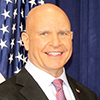
H.R. McMaster is the Fouad and Michelle Ajami Senior Fellow at the Hoover Institution, Stanford University. He is also the Bernard and Susan Liautaud Fellow at the Freeman Spogli Institute and lecturer at Stanford University’s Graduate School of Business. He was the 25th assistant to the president for National Security Affairs. Upon graduation from the United States Military Academy in 1984, McMaster served as a commissioned officer in the United States Army for thirty-four years before retiring as a Lieutenant General in June 2018.







